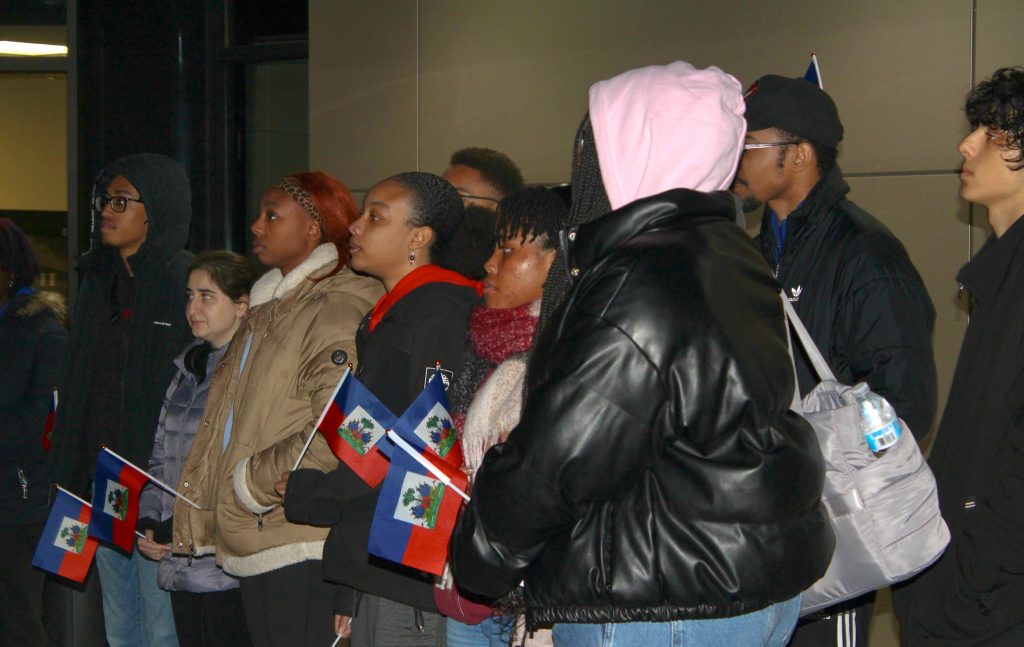The Haitian Student Association and the Thurgood Marshall Pre-Law Society held a rally in solidarity with Haiti amid the ongoing humanitarian crisis in the country.
Held Wednesday night, the rally began in the University Union Undergrounds lounge, with a presentation on the country’s crisis. A Kahoot! game started it off, testing students on Haitian trivia. Jerry Valentin, the president of HaSA and a senior majoring in cinema — and Chelsea Brothers, the political coordinator of TMPS and a senior majoring in philosophy, politics and law, discussed historical and recent events contributing to its instability.
“This rally can shed light on the struggles facing Haitians both in Haiti and in the United States through the various — and hopefully productive — discussions that will take place during the rally,” HaSA wrote to Pipe Dream. “Opinions will be shared, and we hope those discussions will lead to fruitful thoughts for change in Haiti and its people. Change has to start somewhere, and we hope it can come from us college students.”
Valentin and Brothers pointed to the corruption of the Duvalier regime throughout the 20th century and the 2021 assassination of Haitian president Jovenel Moïse by foreign mercenaries as sparking continued gang violence and political turmoil.
The political crisis has left significant portions of the nation — including the capital city of Port-au-Prince — under armed gang control. The United Nations estimates that gang warfare has left more than 300,000 Haitians homeless, with thousands of children denied access to education as schools are converted to temporary shelters.
“By us examining this legal system, we are promoting critical thinking and solutions to which we can be a part of this change,” Brothers wrote. “In terms of fighting global injustice, it’s crucial that we not only educate ourselves, but that we educate the Binghamton population through informing them about issues partaking in Haiti, resources in how to help, and through encouraging students and faculty to not be silent or complicit on this matter but to spread awareness.”
After the presentation, students wrote notes on posters, responding to questions the organizers posed. The posters, along with Haitian flags, were taken outside during the rally, which began with a march from the Undergrounds to outside the Engineering Building, as speakers chanted “All eyes on Haiti.” Representatives from student organizations Students for Justice in Palestine, the Black Student Union and the Latin American Student Union assembled around the main entrance to speak.
Members of HaSA’s Executive Board began by discussing their ties to Haiti and their devastation at the ongoing crisis. Stephanie Pierre-Louis, HaSA’s historian and a sophomore majoring in biology, shared her perspective as a Haitian American.
“During these difficult times, I pray that Haiti can find its way back to the peace and prosperity that it deserves,” Pierre-Louis said. “I hope for a future where Haiti can celebrate their heritage freely, share their culture without fear, and rebuild a Haiti where beauty, strength and hope are everyday realities. May Haiti rise again as the beautiful land it once was and always will be in the hearts of its people.”
Aurelie Narcisse, the public relations and education coordinator for HaSA and a sophomore majoring in biochemistry, read a poem she wrote highlighting the emotional struggles felt by many Haitians during this period of uncertainty.
A member of SJP’s E-Board drew a connection between the situation in Haiti and the suffering of people in Gaza.
“How can we call for a free Palestine without recognizing the humanitarian crisis in Haiti, both of which are struggles influenced and perpetuated by Western powers — byproducts of colonization,” the representative said. “From Palestine to Haiti, the call for the liberation of any formerly colonized people is something that transcends borders and it is our unity that will organize change in this world.”
Jayden Perez — secretary and political coordinator of LASU and a senior majoring in psychology and mastering in public administration — followed, connecting the humanitarian crisis to the country’s historical and current relationships with Western powers. The Haitian Revolution — a successful slave revolt against a colonial power — began in 1791 against France, ending with independence in 1804.
Haiti was then forced to pay reparations to both France and the United States, amounting to billions in today’s U.S. dollars to France through the mid-20th century. The United States later occupied Haiti from 1915 to 1934, continuing to control the country’s public finances until 1947.
Perez then referenced rhetoric against Haitian immigrants used by now-President-elect Donald Trump in the September presidential debate.
“The modern crisis of Haiti is not just one of corruption, natural disaster and gang violence, but of imperialism, exploitation and racism,” Perez said. “We must not forget the past, for it is the only way we can create a path for Haiti to be free.”
The rally was part of HaSA’s Haitian Awareness Week celebrations, following tabling in the Glenn G. Bartle Library and a Haitian trivia Jeopardy! game. Later in the week, HaSA hosted a Konpa workshop with Black Dance Repertoire, teaching the traditional Haitian dance.
“We hope that [the rally] brings a breath of fresh air to the Haitian population,” HaSA wrote. “We want the Haitian population to see that the Haitian Youth who are in college, though far from home or those who do not even know what home looks like, want to see a change for their country. The Haitian youth wants to see more unity among Haitians all over so that we can come together to help change Haiti.”



